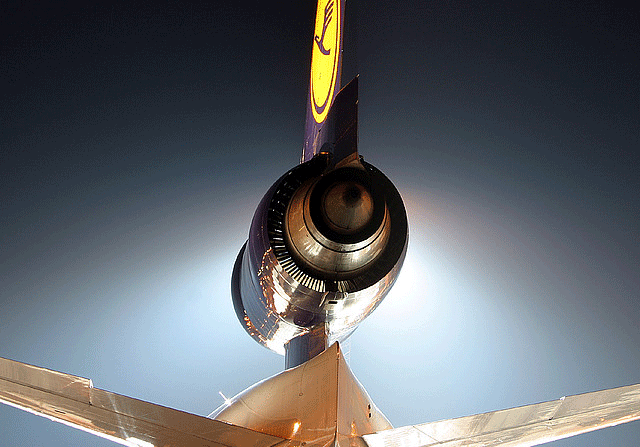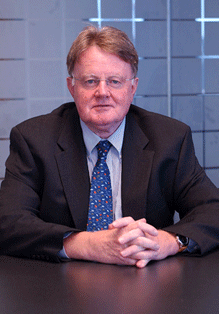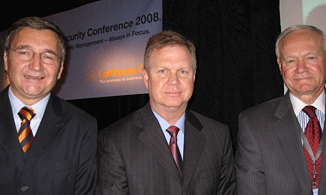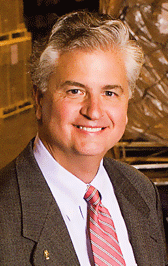Terror
Awaits Opportunity

 When
Klaus Holler, Lufthansa Cargo Head of Area Management The Americas
called the big security meeting to order Tuesday, September 30 inside
the Garden City Hotel near JFK International Airport in New York
it was not without a sense all around that with new mandates toward
TSA compliance coming up on the horizon, Lufthansa Cargo is redoubling
its effort to maintaining itself as former New York City Police
Commissioner Howard Safir puts it as “the gold standard,”
in airline cargo security. When
Klaus Holler, Lufthansa Cargo Head of Area Management The Americas
called the big security meeting to order Tuesday, September 30 inside
the Garden City Hotel near JFK International Airport in New York
it was not without a sense all around that with new mandates toward
TSA compliance coming up on the horizon, Lufthansa Cargo is redoubling
its effort to maintaining itself as former New York City Police
Commissioner Howard Safir puts it as “the gold standard,”
in airline cargo security.
Holler, who once served as top gun
at the critical Lufthansa Cargo Center in Frankfurt, has been at
the helm in USA since 2006.
He understands full well the importance
of security and the “keep it simple” concept having
also served as a top ground executive at the Lufthansa Cargo hub
at Sharjah.
“The shortest distance that
air cargo moves is from acceptance, through the warehouse to waiting
aircraft and back again on the same path to the pick up area.
“How secure consignments are
handled across that space is the major driving force in success
or failure in the air cargo business today and tomorrow.”
Commissioner Safir who was top cop
responsible for the entire New York City Police Force during the
time of Mayor Giuliani and before and after September 11, 2001 couldn’t
agree more:
“Terror is just waiting to strike
again.
“It is not a matter of ‘if,’
rather it is when they will strike.
“I have looked into the eyes
of the Islamic Jihadist.
“They have hate, determination,
intelligence and cunning.
“Because of the success of 911,
there are entrepreneurial groups cropping up that we must be ever
vigilant and watching out for.
“No room for complacency either,”
Howard Safir declared.
“Terrorists are looking for
soft targets.”

In New York at Lufthansa's second security conference,
pictured left to right are Harald Zielinski, Bill McReynolds, and
Howard Safir.
Bill McReynolds, Chairman
Cargo Committee, Airline Pilots Association also had some thoughts.
“We need to apply the same standards
of security to both cargo and passengers.
“What that means is a clamping
down of security on all cargo flights by applying the same edicts
of background checks and fingerprinting and other devices normal
to the rest of the industry.
“Ramp access, onboard activities,
the all cargo flight deck and other operations are often the weak
link in the security chain.”
The FedEx pilot acknowledged the need
for a commercially viable solution while also praising EL AL for
its security.
“We don’t have to look
far to find some excellent examples of total security in the airline
business and that is EL AL Israel Airlines.”
Harald Zielinski, Lufthansa Cargo
Security Chief says something that we have never heard before from
any airline cargo executive:
 “We
reinvest 100% of every security surcharge paid to Lufthansa Cargo
right back into improving security. “We
reinvest 100% of every security surcharge paid to Lufthansa Cargo
right back into improving security.
“Across the board since 2000
we have charted a downward trend in cargo theft that will continue
once again in 2008.
“The challenges are the new
edicts toward 100% security that will continue to raise our costs
all around.
“These expenses are quite basic
to us and must be met not only for compliance but as the way we
do business.
“We have a few stations around
the world where we do not accept export cargo if we cannot control
the process.”
Professor John Hansman (left) from
The Massachusetts Institute of Technology (MIT) lifts the audience
with his professorial delivery of what sounds a little like a Star
Wars approach to the future of air cargo security.
“Machinery always delivers the
same attentiveness to the requirement.
“Technology is not a panacea
but neither in my view is a one size fits all approach to air cargo
security.”
“Air cargo screening will include
new technologies.
“Future screening should not
be static but able to observe all sides of any subject.
Prof Hansman spoke of applications
utilizing gamma ray and new technology x-ray, “still to be
proven.”
So did the Lufthansa Cargo Security
Conference work?
 Joe Frigger, CEO Emo Trans had this
to say:
Joe Frigger, CEO Emo Trans had this
to say:
"I found this conference to be
a positive and necessary discussion with a good mix of people. There
needs to be a constant exchange between everyone involved in the
supply chain. For example, tomorrow will debut the 100% screening
requirement for narrowbody aircraft (domestic). For an international
forwarder like myself, the implementation of this requirement will
serve as a learning platform for further requirements come February
1, 2009 and beyond."
Other attendees we talked to were
also enthusiastic.
“I enjoyed the future talk but
also the afternoon sessions that included TSA,” said one participant.
“There is so much at stake for
all of us, so keeping on the same page with our partners right now
is critical," said another.
“For the freight forwarder all
the rules are quite confusing.
“Here we learned something plus
we made contact with some experts and also shared and networked
with other disciplines in air cargo.
“Time well spent.”
As the day ended we found one of those
small combination travel locks and some brochures that host Lufthansa
Cargo provided. While looking for something to padlock came the
realization that security, like rust, never sleeps.
Geoffrey/Sabiha
|
Quote
Of The Year (So Far)
 Announcement
Tuesday Sept 30 that all Alitalia unions back CAI rescue plan and
that AF KLM, Lufthansa are eyeing stakes in the Italian carrier,
brought this from Dave Brooks, President of American Airlines Cargo: Announcement
Tuesday Sept 30 that all Alitalia unions back CAI rescue plan and
that AF KLM, Lufthansa are eyeing stakes in the Italian carrier,
brought this from Dave Brooks, President of American Airlines Cargo:
 Alitalia
has a financial plan in place and the U.S. banking system does not? Alitalia
has a financial plan in place and the U.S. banking system does not?
 Go
figure! Go
figure!
|
Markets
Slow To Crawl
 IATA
numbers guru Brian Pearce delivers some more figures that look suspiciously
like déjà vu all over again or like the last set of
monthly numbers as the world airline business buffeted by fuel prices
and slowing economies further slows down to 1.3% growth in international
RPKs during August, reflecting deteriorating economic conditions. IATA
numbers guru Brian Pearce delivers some more figures that look suspiciously
like déjà vu all over again or like the last set of
monthly numbers as the world airline business buffeted by fuel prices
and slowing economies further slows down to 1.3% growth in international
RPKs during August, reflecting deteriorating economic conditions.
“This follows sharp slowdown
to 1.9% in July, after reasonably robust first half growth of 5.4%.
“Asia-Pacific airlines led the
slowdown with -3.1%, which overwhelmed modest improvements in North
American and Europe.
“Even if Asia is depressed by
temporary factors, economic conditions continue to deteriorate pointing
to weaker air travel ahead.
“Air cargo volumes continue
to perform worse than passenger markets, with a 2.7% fall during
August. Unlike passenger markets, weakness in air freight is broad-based,
suggesting a significant decline in world trade.
“Of great concern is the further
fall in load factors, in spite of attempts to slow capacity growth,
reducing unit revenues and adding to pressure on profitability.
“Load factors in August at 79.2%
were 1.8% lower than last year, including a 3.7% point decline for
Asia-Pacific airlines.”
|
| 
U.S. Government is looking at the first bomb-resistant
luggage container, a 5-foot-by-5-foot Kevlar container. But if you
can believe this, U.S. Congress
gave TSA no money for the containers, so it will not require airlines
to use them, USA Today said.
"Carriers won't pay for them," because of problems such
as the container's 265-pound weight and $18,000 cost, said David
Castelveter, spokesman for the Air
Transport Association . . .
As reported here last week Japan
Airlines (JAL) has now confirmed it will cease all freighter-only
operations between Tokyo (Narita) and
New York and reduce freighter flight
frequency from 6 to 5 flights per week on the Tokyo
(Narita)-Los Angeles route. By the
end of November 2008, JAL will also have retired from service its
last remaining two 747-200 freighter aircraft. JAL is also canceling
conversion of one of its 747-400 passenger aircraft into a freighter
aircraft, as had originally been planned .
. . Meantime Boeing

successfully completed a high-pressure test, known as "high
blow," on the 787 Dreamliner static
test airframe at its Everett factory September 30. The test is one
of three static tests that must be cleared prior to first flight
. . . Airbus
officially opened its first final assembly line outside of Europe
September 30 in Tanjin, China. Chinese
Premier Wen Jiabao, together with the
Party's Secretary of Tianjin, Zhang Gaoli
and Airbus President and CEO Tom Enders
inaugurated the Airbus A320 facility.. . .
Geoffrey |
|



